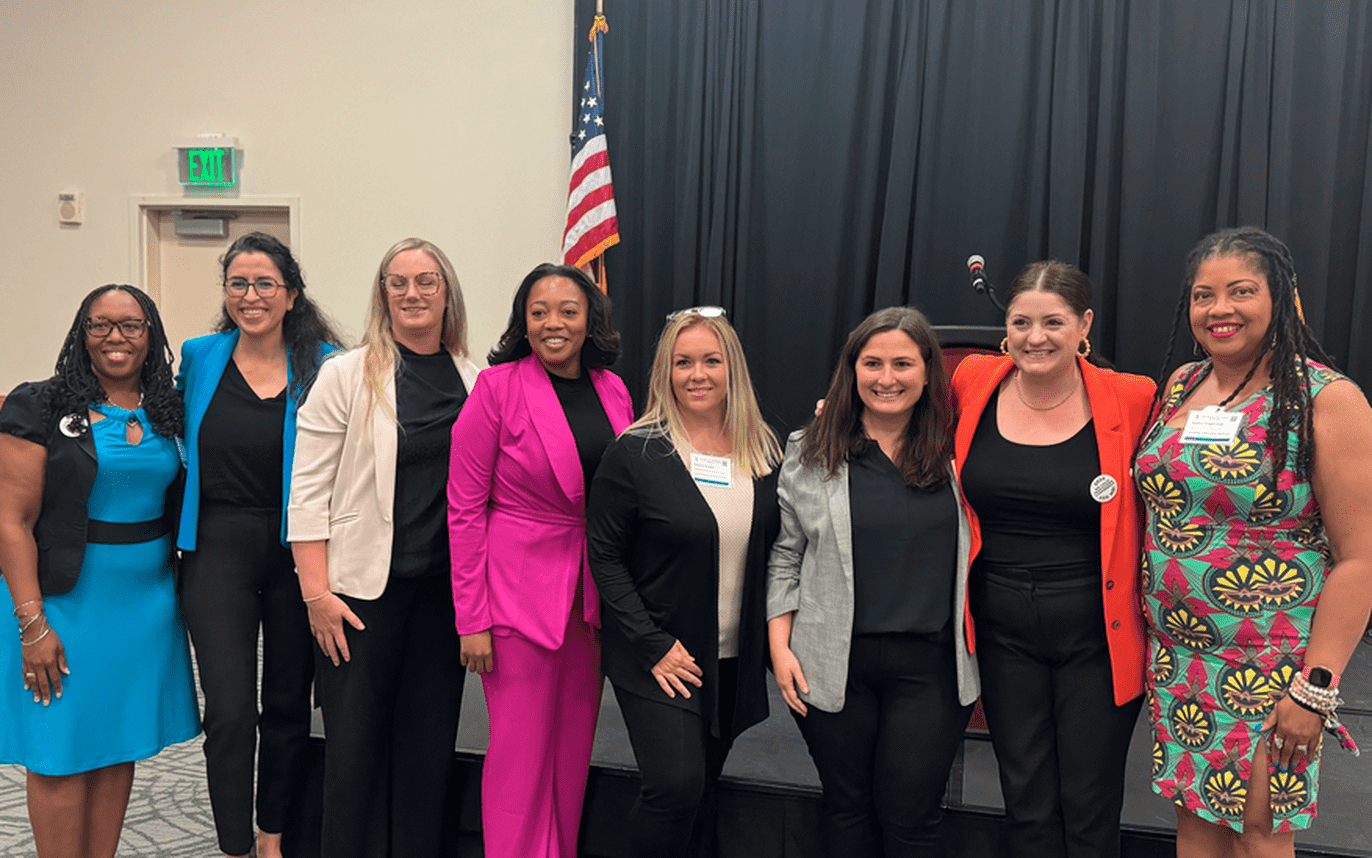UMB Conference Unites Experts to Combat Child Trafficking
July 10, 2024 Brittney Bookins
The 2024 Maryland Child Trafficking Conference was co-sponsored by the Prevention of Adolescent Risks Initiative at the School of Social Work and the UMB Center for Violence Prevention.
Photo: Left to right, Jessica Dickerson, Victim Services Coordinator, Maryland Department of Juvenile Services; Natalia Aguirre, Victim Justice Specialist, Office for Victims of Crime; Melissa Snow, Executive Director, National Center for Missing and Exploited Children; Phylicia Porter, Councilwoman, Baltimore City Council; Heather Amador, Director of Victim Services Policy and Programs, Governor’s Office of Crime Prevention and Policy; Kaitlyn Zedalis, Associate Director of Research, Learning, and Advocacy, Covenant House New Jersey; Amelia Rubenstein, Director, Prevention of Adolescent Risks Initiative (PARI), University of Maryland School of Social Work; and Nadine Finigan-Carr, Executive Director, UMB Center for Violence Prevention/PARI
The 2024 Maryland Child Trafficking Conference, held on June 27, united a diverse group of professionals and community members in a concerted effort to protect children from the horrors of trafficking. According to Baltimore City Public Schools, over 4,300 students faced homelessness in 2023. This statistic, coupled with the research of Kaitlyn Zedalis of Covenant House New Jersey, underscores the need for comprehensive strategies to prevent trafficking and support at-risk youth.
Organized in partnership by the University of Maryland, Baltimore (UMB) Center for Violence Prevention, the University of Maryland School of Social Work’s (UMSSW) Prevention of Adolescent Risks Initiative (PARI), the Maryland Governor’s Office of Crime Prevention and Policy, and the Maryland Human Trafficking Task Force, the conference delved into the complexities of vulnerabilities that contribute to child trafficking, providing valuable insights and innovative approaches to combat this pressing issue.
“For the past seven years, we have worked to ensure that practitioners and researchers across the state move from awareness to action in support of youth at risk for human trafficking. It is great that we are able to be back in person this year to move this important work forward,” said Nadine Finigan-Carr, PhD, MS, executive director of the UMB Center for Violence Prevention.
Melissa Snow, executive director of Child Sex Trafficking Programs at the National Center for Missing and Exploited Children (NCMEC), delivered the keynote address, highlighting the importance of creating a robust support system for survivors.
“Survivors need to know that there is a team behind them supporting them,” Snow said. She revealed that in 2023, NCMEC received 400 reports of missing children likely connected to sex trafficking. “Additionally, one out of six missing children reported to NCMEC who had run away were likely victims of child sex trafficking, often due to unstable home environments and community issues.”
Snow stressed that traffickers prey on the vulnerabilities of children who lack love and acceptance, often targeting those running from abusive or impoverished situations. “Running is a problem,” she said, explaining how push factors like abuse and poverty drive children away, while pull factors like money and acceptance lure them into dangerous situations. She also emphasized the hidden aspects of trafficking, such as the use of social media and a secret emoji language to communicate between traffickers and victims.
The conference underscored the need for community mobilization and the implementation of laws like Safe Harbor that protect child victims from being arrested and charged for crimes committed as a result of their trafficking situation. This law aims to redirect focus from punishment to support and recovery for child victims.
“We know that children and youth are more likely to be exploited through sex and labor trafficking, and young people in Maryland are no exception. Convenings like this conference make sure that professionals who are most likely to intersect with potential victims know how to spot human trafficking and take the first steps to respond,” said Amelia Rubenstein, director of the UMSSW Prevention of Adolescent Risks Initiative.
Kaitlyn Zedalis, associate director of Research, Learning, and Advocacy at Covenant House New Jersey, addressed labor trafficking by forced criminality among homeless youth in a plenary session. She explained that homelessness often leads to involvement in low-level crimes of poverty, escalating to more severe charges over time.
“Labor trafficking by forced criminality is the most common type of labor trafficking among youth experiencing homelessness,” Zedalis noted, underscoring the urgent need for better identification and support systems for these vulnerable individuals.
The conference aimed to not only highlight the vulnerabilities contributing to trafficking but also showcase resilience and hope for a better future through prevention and intervention efforts. Tharyn Giovanni, a PhD student, and graduate research assistant at the Center for Violence Prevention, captured the spirit of the event.
“Labor and human trafficking are critical issues. I’m thrilled to be a part of an initiative that focuses on raising awareness, prioritizing research, and engaging in advocacy to end trafficking. Today was about learning, connecting, and bridging resources to support trafficking survivors,” Giovanni said.
The 2024 Maryland Child Trafficking Conference concluded with a call to action, urging attendees to continue their efforts in combating child trafficking and supporting survivors. By fostering collaboration and sharing knowledge, the event represents a beacon of hope and a significant step forward in the fight to save our children from the perils of trafficking.
Read more about the UMSSW Prevention of Adolescent Risks Initiative.